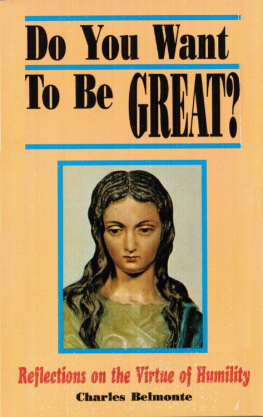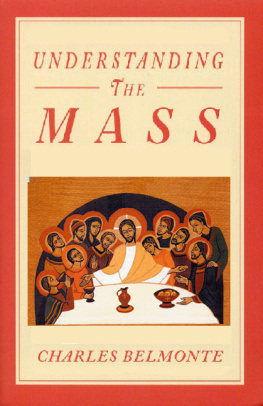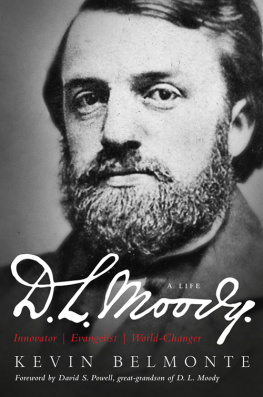Charles Belmonte - Do You Want to be Great
Here you can read online Charles Belmonte - Do You Want to be Great full text of the book (entire story) in english for free. Download pdf and epub, get meaning, cover and reviews about this ebook. year: 0, publisher: Sinag-Tala Publishers, genre: Religion. Description of the work, (preface) as well as reviews are available. Best literature library LitArk.com created for fans of good reading and offers a wide selection of genres:
Romance novel
Science fiction
Adventure
Detective
Science
History
Home and family
Prose
Art
Politics
Computer
Non-fiction
Religion
Business
Children
Humor
Choose a favorite category and find really read worthwhile books. Enjoy immersion in the world of imagination, feel the emotions of the characters or learn something new for yourself, make an fascinating discovery.
- Book:Do You Want to be Great
- Author:
- Publisher:Sinag-Tala Publishers
- Genre:
- Year:0
- Rating:3 / 5
- Favourites:Add to favourites
- Your mark:
- 60
- 1
- 2
- 3
- 4
- 5
Do You Want to be Great: summary, description and annotation
We offer to read an annotation, description, summary or preface (depends on what the author of the book "Do You Want to be Great" wrote himself). If you haven't found the necessary information about the book — write in the comments, we will try to find it.
Do You Want to be Great — read online for free the complete book (whole text) full work
Below is the text of the book, divided by pages. System saving the place of the last page read, allows you to conveniently read the book "Do You Want to be Great" online for free, without having to search again every time where you left off. Put a bookmark, and you can go to the page where you finished reading at any time.
Font size:
Interval:
Bookmark:
Do You Want to Be Great?
Reflections on the Virtue of Humility
CHARLES BELMONTE
Copyright (C) 1992 by Charles Belmonte
Works of Msgr. Josemara Escriv andtheir translations: Copyright (C) Scriptor, S.A.
All other translations (C) copyright bythe author
ISBM 971-91-280-1-1
NIHIL OBSTAT: Msgr. Benedicto S. Aquino
Vice-Chancellor
IMPRIMATUR: + Jaime L. Card. Sin
Archbishopof Manila
The Nihil Obstat and Imprimaturare a declaration that a book is considered free from error in matters of faithand morals and therefore fit for publication. It is not implied that those whohave granted the Nihil Obstat and Imprimatur agree with the contents,opinions, or statements expressed.
Studium Theologiae Foundation, Inc.
6th Floor, Quad Alpha Centrum Bldg.
125 Pioneer, Mandaluyong, Metro Manila
Contents
Part I: Introduction
Part II: Five Holy Men Speak on Humility
Part III: Anthology of Texts On Humility
PREFACE
Doyou want to be great?
Manyyears ago, Sacred Scripture had this question answered for you and me:"Humble yourself the more the greater you are, and you will find gracewith God" (Sirach 3:18).
Yearslater, St Augustine ,the great African Doctor of the Church, explained to us the route togreatness: "Do you want to begreat? Become little. Do you plan to erect a building of colossalheight? Apply yourself first to set asolid foundation --the higher your building, the deeper the foundation shouldbe. The building will be going up; itwill soar high; but first someone must dig the foundations, sink in thedepths. Before going up, buildings godown; they humble themselves. Thefinials and pinnacles gracefully stand up only after the humiliation" (Sermon 142).
Andin modern times, St Francis of Sales gave us the gauge to measure a man'sgreatness: "Do you want to know ifa man is really wise, learned, generous, or noble? Observe if his talents tend to make himhumble, modest, and submissive. If hetends to brag, his talents will be less true in the same proportion as theyappear evident" (Introduction toDevout Life).
Areyou willing to go along this route? Begin your journey of humility by the hand of great saints, masters ofspirituality, from St Augustine to Pope Leo XIII and beyond. You willfind many thoughts of a modern saint, Blessed Josemara Escriv; he, more thananyone, helped many of us to live better our Christian lives. Transmitting to us the reflections of hisrich spiritual life, he would say:
Ishall only stir your memory
sothat some thought may arise
andstrike you:
andso your life will improve
andyou will set out along the way of prayer
andof Love.
Andin the end you will become a soul of worth.
The Way
Ileave you in the company of good friends. They have tried to be great, and they became so. Meditate on these points, apply thesereflections to your daily life, and you will reach your goal.
Part I
Introduction
Finding a Unifying Principle
The mysteries of our Lords lifewere revealed to us for our sanctification, to show us how we should conductourselves before God and our fellow men. Our Lord set before us the example of every virtue, lived in differentcircumstances.
Compare the charming sincerityand docility of the Child of twelve, in the presence of the learned doctors ofthe Law, with the majestic calm and manly fortitude of the Man-God, twenty-oneyears later, before the members of the Jewish Council. The bearing of Jesus on both occasions wasperfect, but how dissimilar the perfection in each. Every period of his life was a perfectpicture. Thus, to put on Christ, wemust study and meditate on all these mysteries. As we do so, we learn to imitate or better, to reproduce in ourselveshis manner of acting.
In the hierarchy of virtues,charity is the first; thus, all the saints have excelled in charity. Yet, as a beautiful landscape differs fromanother, so does one saint differ from another. Each saint seems to have a moral virtue that he has practiced to a highdegree as the unifying principle of his life, as his characteristic. One is remarkable for his apostolic zeal,another for his tenderness toward the suffering, a third for his spirit ofcontemplation, and so on.
Similarly, we can look for someunifying principle in the life of Jesus, a vantage point from which we can seeall his virtues as various manifestations of one unique spirit. Can we trace back these diverse streams andfind the source from which they flow forth?
If this were possible, we wouldbe able to understand our Lords life as a whole, grasp the essential unity inthe rich variety of his life, and acquire a knowledge of our Lords humancharacter such as would not be yielded up by the most profound study of thedifferent events of his life taken separately. What is more, we would have found the key to human existence itself.
What is this unifying andfundamental principle in the human life of our Lord? He has not left us without revealing it tous, for he knew that, by ourselves, we would not have discovered it. He knew that even if we did discover it, wewould still be astray in our efforts to imitate him, for we would have lookedat it as only one principle among many, merely coordinated with the rest, andnot one which is the motive and inspiration of, and which gives meaning to, theothers.
What characterizes thespiritual temperament of our Lord is his humility;a tender, child-like realization of Gods sovereignty and fatherhood. Jesus was the perfect expression of thehumble spiritual childhood that he recommended to us.
Learn of me, he said, that Iam meek and humble of heart. It is asif he said: My words, my works, myvirtues, my sufferings, my perfect endurance of shame and humiliations are thedirect consequence of my humility. I amall that you see me to be, I have all the perfection that you admire in me, yetI am humble. If you wish to imitate mein everything, in my virtues, in my words, in my actions, in my attitude towardGod and toward man, learn of me to be humble of heart.
The perfection of our Lordshuman virtue is linked to the perfection of his humility. Humility did not take the place of the othervirtues; rather, it inspired and guided the mode in which these virtues foundexpression in his life, in his personal relations with God, and with men.#1
Jesus, Our Archetype
Christian humility takes itsroot in Christ, in his incarnation and death (Phil 2:8), in his service to all(cf. Mt 11:29; 20:28; Jn 13:15-16), in everything he did. The more a Christian captures the spirit ofChrists perfect humility, the more Christ-likehe becomes. Men will approximate thecharity of Christ when they approximate the humility of Christ; he expresslyurged us to imitate his humility. Heknew that one virtue follows the other, as the edifice rises on itsfoundations.
A dispute arose between themabout which should be reckoned the greatest, but Jesus said to them, `Amongpagans it is the kings who lord it over them, and those who have authority overthem are given the title of benefactor. This must not happen with you. No; the greatest among you must behave as if he were the youngest, theleader as if he were the one who serves. For who is the greater, the one at table or the one who serves? The one at table, surely? Yet here am I among you as one who serves!(Lk 22:24-27).
Our Lord was not talking tomonks alone, he was talking to ordinary people, who had to live the virtue ofhumility in the midst of the world. Weoften have a vague and incorrect notion of humility. Religious asceticism encourages certain practicesthat help a person acquire and develop humility and curb his pride. We may wrongly think that these are acts ofthe virtue of humility itself; in that case, the true nature of this virtuewould escape us.
Next pageFont size:
Interval:
Bookmark:
Similar books «Do You Want to be Great»
Look at similar books to Do You Want to be Great. We have selected literature similar in name and meaning in the hope of providing readers with more options to find new, interesting, not yet read works.
Discussion, reviews of the book Do You Want to be Great and just readers' own opinions. Leave your comments, write what you think about the work, its meaning or the main characters. Specify what exactly you liked and what you didn't like, and why you think so.













